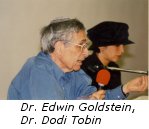|
Substance Abuse in Yeshivot
Panel I: Clinical Views
Summary
Over one hundred and fifty people crowded into the Beit Gesher Auditorium in Jerusalem to participate in the ATID conference on "Students at Risk:
 Substance Abuse in Yeshivot - Jewish Education Facing the Challenge."
Participants ranged from rabbis and teachers in various Yeshivot and seminaries, to administrators, youth workers, and caring people from the general community. Substance Abuse in Yeshivot - Jewish Education Facing the Challenge."
Participants ranged from rabbis and teachers in various Yeshivot and seminaries, to administrators, youth workers, and caring people from the general community.
Dr. Dodi Tobin, psychologist, ATID Fellow, and Director of Admissions and Recruitment at Nismat, chaired the first session, focusing on "The Clinical View." In her opening remarks, Dr. Tobin reminded the audience that substance abuse is nothing new; we see it all around us, be it in the media, on city streets, or perhaps even among acquaintances, friends or family members. It has reached the point, however, that we can no longer ignore this issue in the religious community. It has become a reality for our youth and in our Yeshivot, and it is our job as educators to face up to the problem, attempt to understand it, and intervene.
Yonah Pollack, an Addictions Specialist and Therapist, began by stating that substance abuse, students at risk, and how it affects our schools and communities, is the most important challenge the Orthodox world has to deal with today. He also stated the importance of everyone working together to solve this problem.
Mr. Pollack then went into a "crash course" on the basics of substance abuse, along with the aid of numerous handouts that were provided to program participants. In discussing addiction, he chose to utilize the World Health Organization definition, which states that addiction is "a recurring pathological relationship with a person, a thing, or an event with life damaging consequences." The most important word there is "relationship"- alcohol itself isn't the problem, rather the relationship which is formed with the substance. The only way to overcome this addiction is through abstinence.
Mr. Pollack described various statistics and symptoms of substance abuse, reminding the audience of the importance of being able to identify what stage their students might be at, and the realities of the different types of caring necessary. In particular, he stresses the building of a relationship with the youth, as well as identification of potential responses and defenses that youth are likely to use.
Following this background information, participants were informed that we need to be aware of denial of this problem in our own community. While there has been a major increase in the amount of attention this issue is receiving, that in itself is an indication of the severity of the problem.
Regarding the particular population of the one-year programs for Diaspora students, Pollack stressed the challenges in dealing with this age group, including the lack of responsibility while they are in Israel, freedom of being away from home, and learning disabilities as real issues in dealing with this population.
He concluded by reminding participants of the importance in focusing on the individual and his own personal identity and growth. While it is difficult at times, it is vital that we stick with these kids, and, rather than "kicking them out" of our Yeshivot, "transferring them" to another, more appropriate setting.
Following Yonah Pollack, Dr. Edwin Goldstein, a psychiatrist who treats many adolescents from the broad Orthodox community in the New York-New Jersey area addressed the audience. He stressed that the goal of this type of conference is to increase the sensitivity and awareness of our teachers to those issues which lead our youth to becoming involved in drugs. Most importantly, Dr. Goldstein stated, is finding the way to keep the doors to Judaism open, and to maintain our connection with these kids. If the door is open, the youngster will often come back through.
One of the major issues is the response of our educational systems. When a student is found to be using drugs, the usual response is to expel them from the yeshiva. Dr. Goldstein asked, "How can we afford to throw away Jewish kids?" Here again, the educators, the people on the inside, are key, as they are the first line of defense, not as drug counselors, but as teachers and rabbis.
At one point, according to Dr. Goldstein, those in the orthodox world that abused substances were but a few deviants; by removing them from the community, everyone would be safe. That is no longer the case. Oftentimes, those that get involved are good, well-meaning people, who are having difficulty dealing with stress, learning disabilities, lack of self-confidence, the ups-and-downs of adolescence, or even genetic disorders often found in the Ashkenazi Jewish population. Until now, the Jewish community has been reluctant to deal with these issues. Dr. Goldstein emphasizes that good treatment doesn't involve separating the youth from their religious roots and background, but rather to deal with the individual in terms of their own alienation from their own community.
Dr. Goldstein concluded by reminding participants that the key is the early recognition and caring of the child at risk by the rabbis and teachers, as well as consultation between educators and mental health professionals.
The rest of the session was dedicated to questions from the audience and the panelist responses. Issues raised dealt with the educators' role in the picture, eating disorders, prevention, stigma, and more. For the full program, please see the transcript of the session.
 Download
the full transcript Download
the full transcript
 Listen to
Audio file Listen to
Audio file
 Download the
Audio file Download the
Audio file
This summary was prepared by David Beker.
|